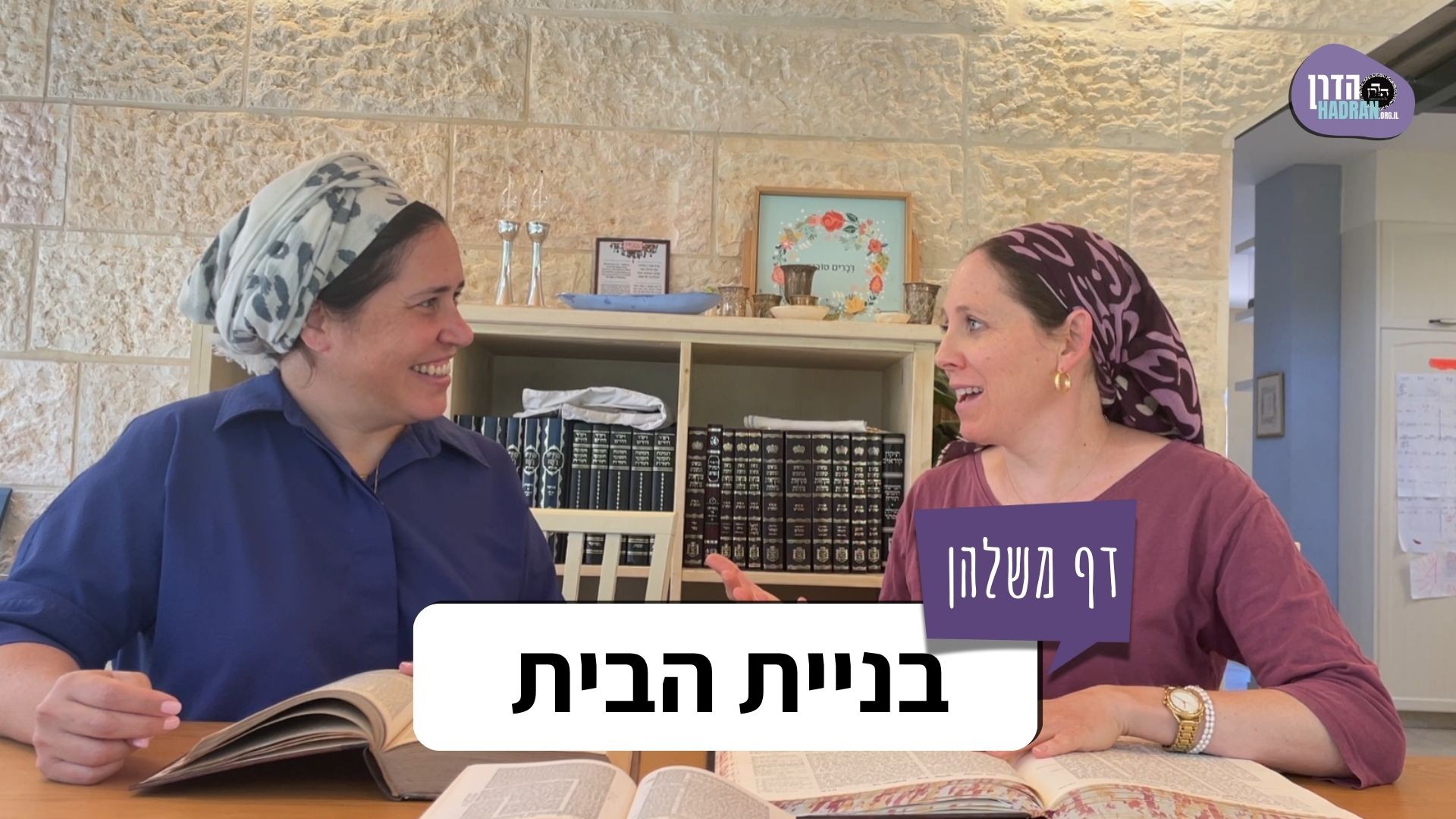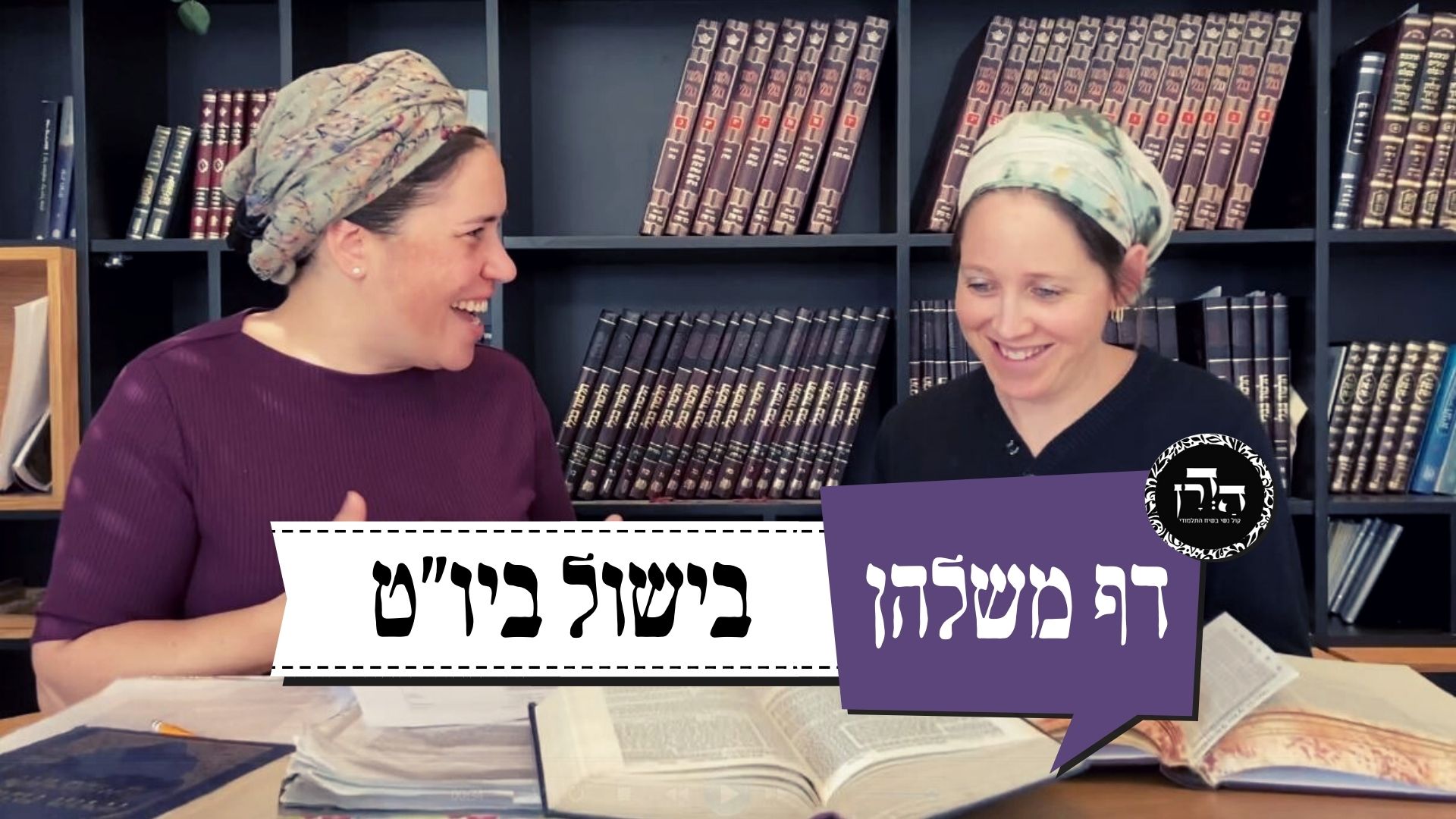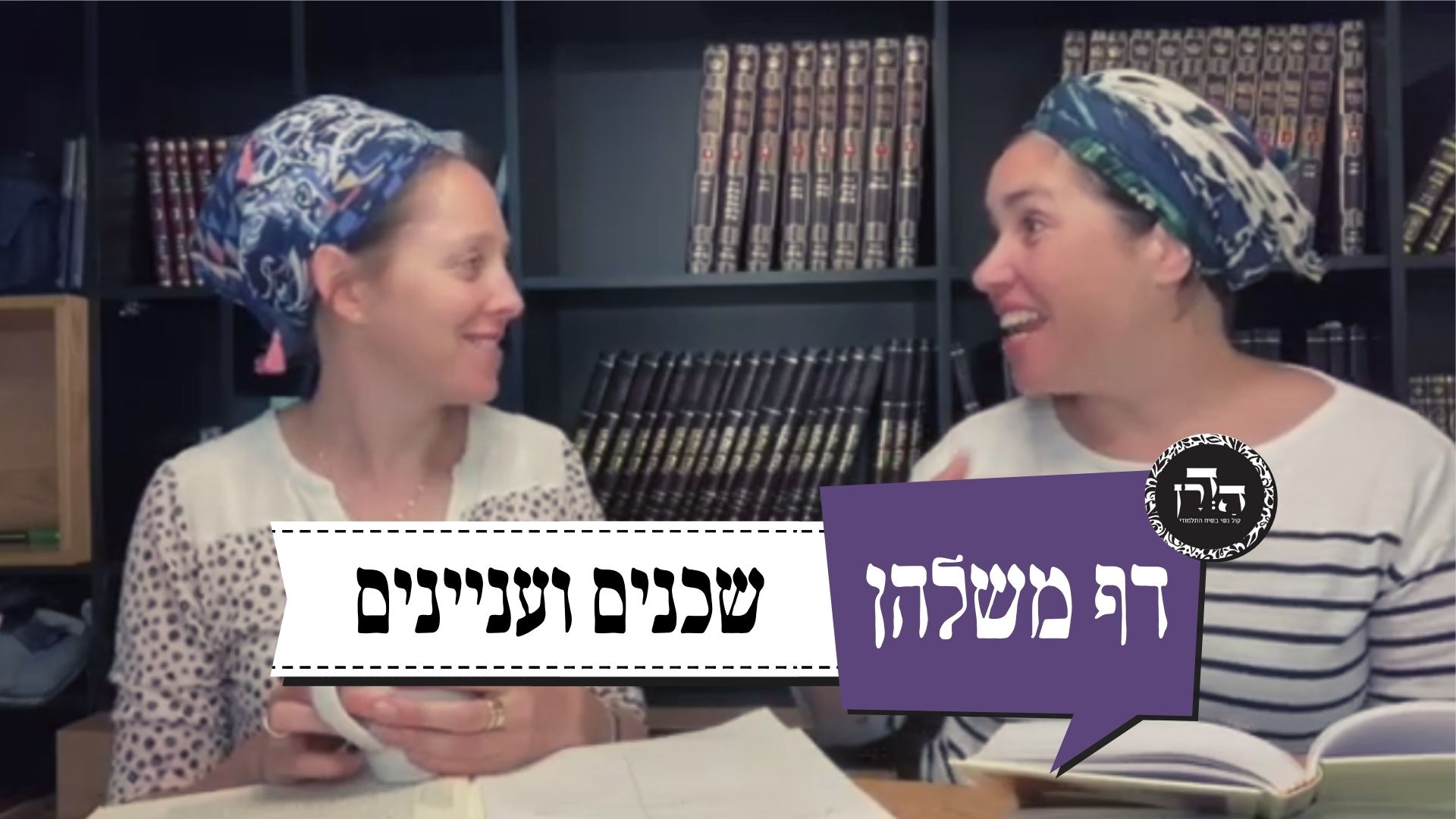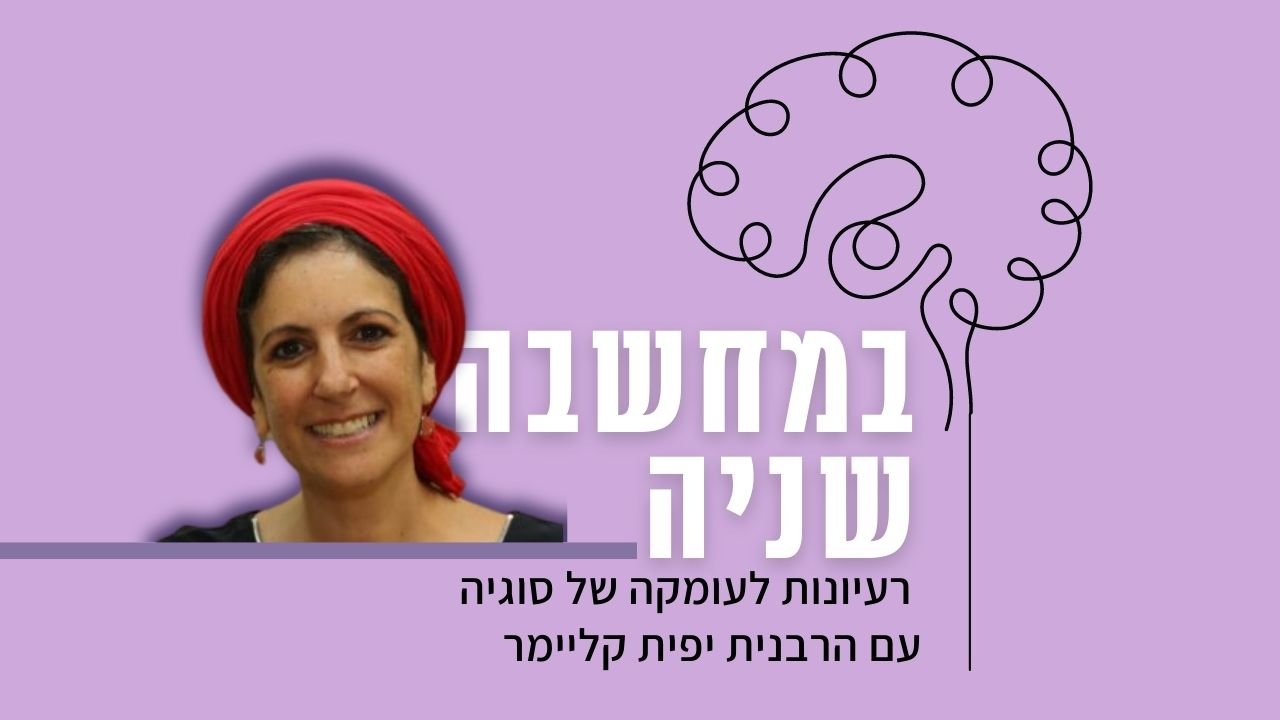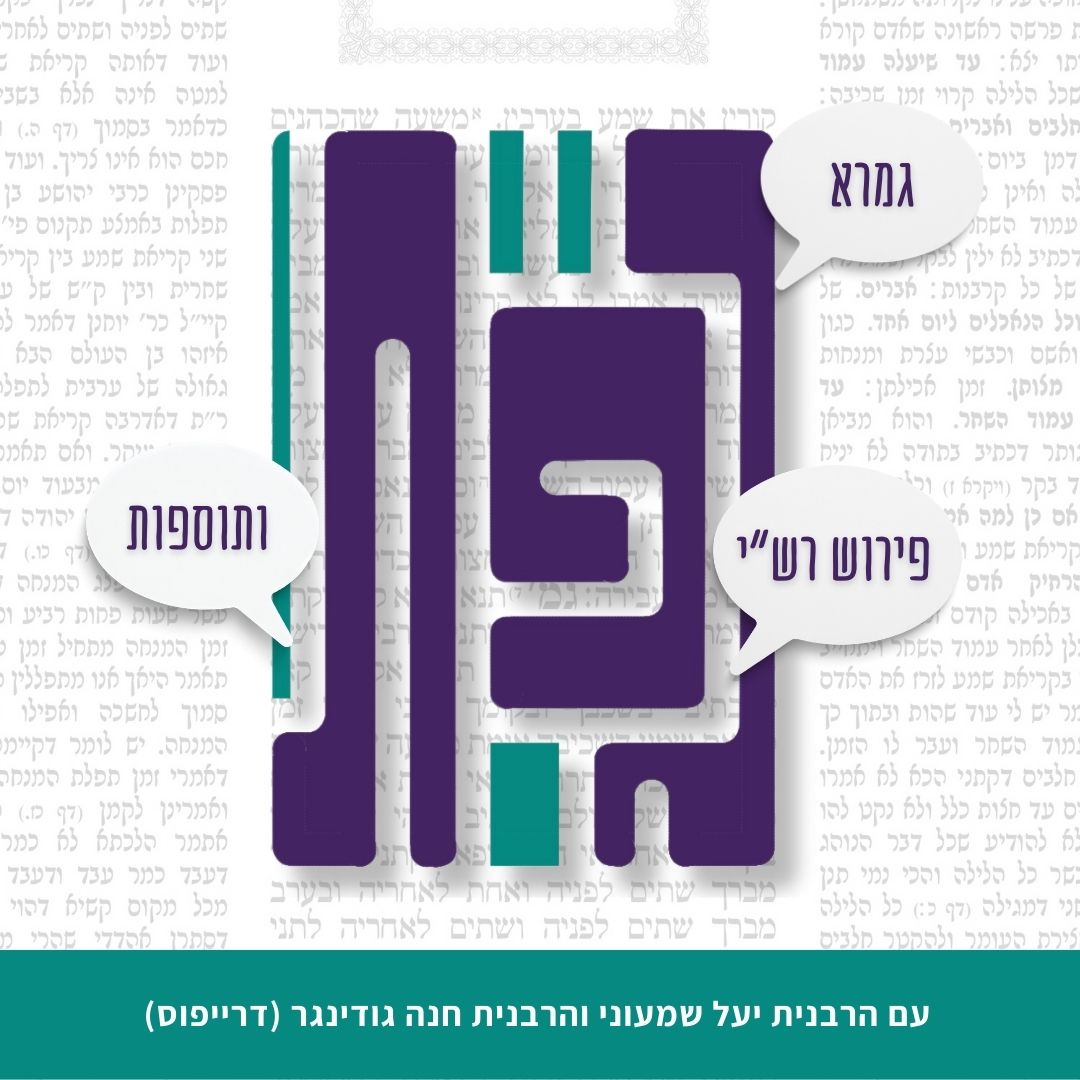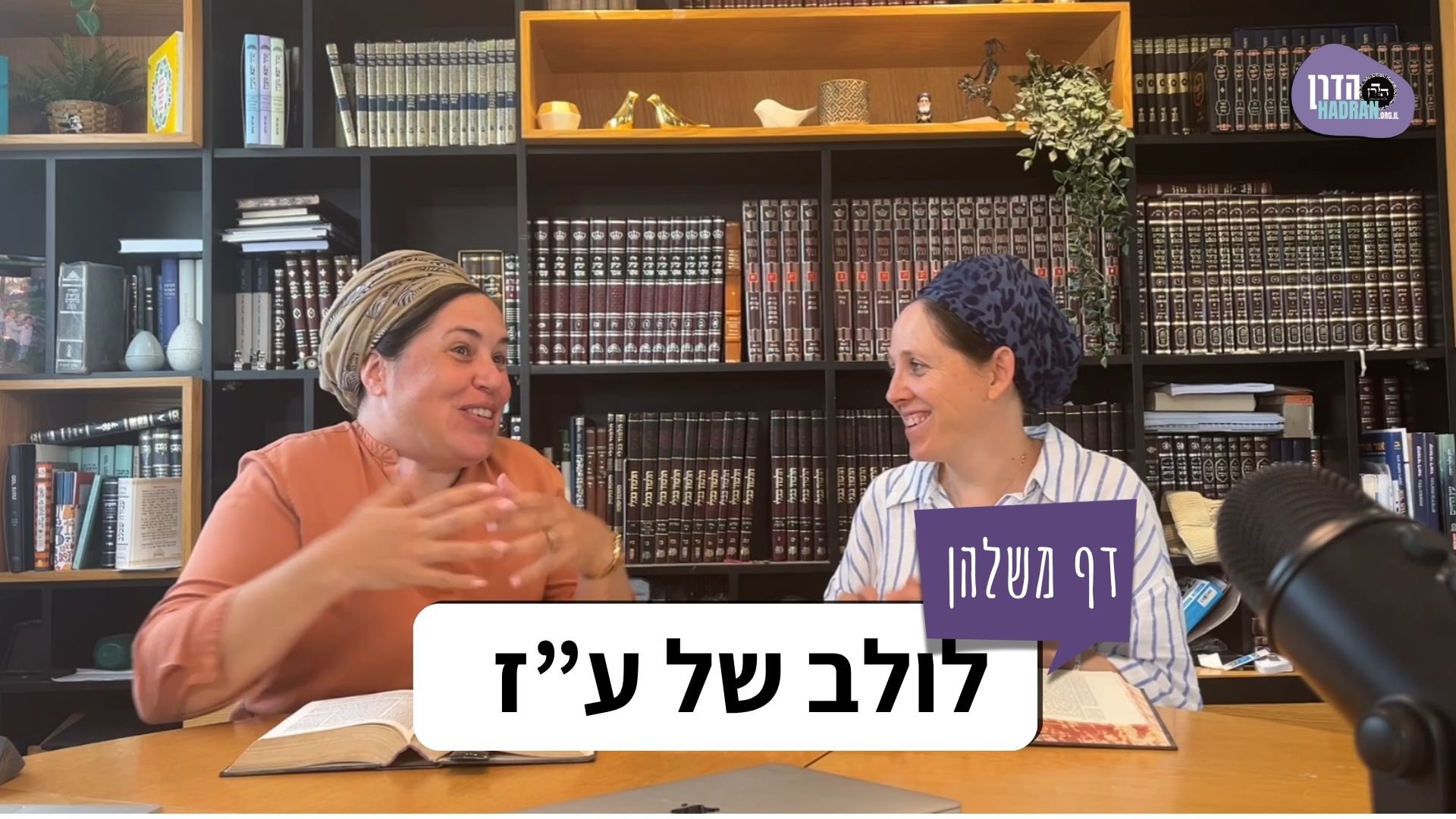האם אפשר להקדיש משהו שלא בעולם עדיין? האם הדיון התקיים בקשר לסוגיה שלנו – בקשר להבנת המשפט במשנה "שור זה עלי עולה – אינו חייב באחריות” או האם זה התקיים ביחס לסוגיה אחרת על מי שהקדיש בית שהשכיר למישהו אחר? באיזה מקרים יכול גזבר המקדש לבוא לבית ולקחת חפץ כמשכון אם הבעלים לא מביאים קרבן שהבטיחו/חייבים להביא? מחלוקת בין שמואל ועולא לגבי מתי צריך דעת הבעלים בעניין קרבן באופן שונה לעולה מאשר לחטאת ולאשם – שעת הפרשה או שעת הקרבה? לגבי גט, אפשר להכריח גבכר לתת גט לאשתו בתנאי שהכריחים אותו לרצות לתת ושהוא יאמר "רוצה אני”
רוצה להקדיש שיעור?
כלים
העמקה
רוצה להבין מה באמת קורה מתחת לפני השטח של הסוגיה?
שיעורים, פודקאסטים והרחבות של מיטב המורות שלנו יפתחו לך עוד זוויות וכיווני חשיבה.
חדשה בלימוד הגמרא?
זה הדף הראשון שלך? איזו התרגשות עצומה! יש לנו בדיוק את התכנים והכלים שיעזרו לך לעשות את הצעדים הראשונים ללמידה בקצב וברמה שלך, כך תוכלי להרגיש בנוח גם בתוך הסוגיות המורכבות ומאתגרות.
פסיפס הלומדות שלנו
גלי את קהילת הלומדות שלנו, מגוון נשים, רקעים וסיפורים. כולן חלק מתנועה ומסע מרגש ועוצמתי.
ערכין כא
הִקְדִּישׁוֹ הַדָּר בּוֹ — מַעֲלֶה שָׂכָר לַהֶקְדֵּשׁ. הִקְדִּישׁוֹ הַדָּר בּוֹ? הֵיכִי מָצֵי מַקְדֵּישׁ לֵהּ? ״אִישׁ כִּי יַקְדִּישׁ בֵּיתוֹ קֹדֶשׁ״ אָמַר רַחֲמָנָא, מָה בֵּיתוֹ בִּרְשׁוּתוֹ — אַף כֹּל בִּרְשׁוּתוֹ! הָכִי קָאָמַר: הִקְדִּישׁוֹ מַשְׂכִּיר — הַדָּר בּוֹ מַעֲלֶה שָׂכָר לַהֶקְדֵּשׁ.
If the one living in it, i.e., the renter, consecrates the house, he pays the rent to the Temple treasury. The Gemara express surprise at this last statement of the baraita: If the one living in the house consecrates it? How can the renter consecrate it? The Merciful One states: “When a man shall sanctify his house to be sacred” (Leviticus 27:14), from which it is derived that just as one’s house is in his possession, so too, anything that one consecrates must be in his possession. If so, the renter cannot consecrate the house, as he is not its owner. The Gemara answers that this is what the baraita is saying: If the one renting out the house consecrates it, the one living in it pays the rent to the Temple treasury.
הִקְדִּישׁוֹ מַשְׂכִּיר, הֵיכִי דָּיַיר בֵּיהּ? בִּמְעִילָה קָאֵי! וְתוּ מַעֲלֶה שָׂכָר לַהֶקְדֵּשׁ? כֵּיוָן דִּמְעַל בֵּיהּ, נָפֵיק לֵיהּ שָׂכָר לְחוּלִּין!
The Gemara asks: If the one renting out the house consecrates it, how is it possible for the renter to live in it? Since the house is consecrated property he is standing liable for the prohibition of misuse of consecrated property by living there. And furthermore, why must he pay the rent to the Temple treasury? Since he misused consecrated property the payment of the rent immediately leaves the state of consecration and becomes non-sacred.
דְּאָמַר: ״לִכְשֶׁיָּבֹא שְׂכָרוֹ יִקְדַּשׁ״, וְהָא אֵין אָדָם מַקְדִּישׁ דָּבָר שֶׁלֹּא בָּא לָעוֹלָם!
The Gemara answers: The baraita is discussing a case where the one renting out the house says: When the payment of the rent will come to me, the money shall be consecrated. The Gemara asks: But how is it possible for the one renting out the house to consecrate money he will receive in the future? After all, a person cannot consecrate an entity that has not yet come into the world.
אָמַר רַב יְהוּדָה אָמַר רַב: הָא מַנִּי? רַבִּי מֵאִיר הִיא, דְּאָמַר: אָדָם מַקְדִּישׁ דָּבָר שֶׁלֹּא בָּא לָעוֹלָם. אִיכָּא דְּאָמְרִי: אֲמַר לֵיהּ רַב פָּפָּא לְאַבָּיֵי, וְאָמְרִי לַהּ רַב מָרִי בַּר חָמָא לְרַב חִסְדָּא: כְּמַאן? כְּרַבִּי מֵאִיר, דְּאָמַר: אָדָם מַקְדִּישׁ דָּבָר שֶׁלֹּא בָּא לָעוֹלָם? אֲמַר לֵיהּ: וְאֶלָּא כְּמַאן?!
Rav Yehuda says that Rav says: In accordance with whose opinion is this baraita? It is in accordance with the opinion of Rabbi Meir, who says: A person can consecrate an entity that has not yet come into the world. Some say that Rav Pappa said to Abaye, and some say that Rav Mari bar Ḥama said to Rav Ḥisda: In accordance with whose opinion is this baraita? Is it in accordance with the opinion of Rabbi Meir, who says that a person can consecrate an entity that has not yet come into the world? He said to him: Rather, in accordance with who else’s opinion could this baraita be? Certainly it is in accordance with the opinion of Rabbi Meir.
מַתְנִי׳ חַיָּיבֵי עֲרָכִין — מְמַשְׁכְּנִין אוֹתָן, חַיָּיבֵי חַטָּאוֹת וַאֲשָׁמוֹת — אֵין מְמַשְׁכְּנִין אוֹתָן, חַיָּיבֵי עוֹלוֹת וּשְׁלָמִים — מְמַשְׁכְּנִין אוֹתָן.
MISHNA: With regard to those obligated to pay valuations, the court repossesses their property to pay their debt to the Temple treasury. With regard to those obligated to bring sin offerings and guilt offerings, the court does not repossess their property; since one is obligated to bring them for atonement he would not delay bringing them. But with regard to those obligated to bring burnt offerings and peace offerings, the court repossesses their property;since these offerings are not obligatory for atonement, one might delay bringing them.
אַף עַל פִּי שֶׁאֵין מִתְכַּפֵּר לוֹ עַד שֶׁיִּתְרַצֶּה, שֶׁנֶּאֱמַר: ״לִרְצוֹנוֹ״, כּוֹפִין אוֹתוֹ עַד שֶׁיֹּאמַר: ״רוֹצֶה אֲנִי״. וְכֵן אַתָּה אוֹמֵר בְּגִיטֵּי נָשִׁים, כּוֹפִין אוֹתוֹ עַד שֶׁיֹּאמַר: ״רוֹצֶה אֲנִי״.
Although one obligated to bring burnt offerings and peace offerings does not achieve atonement until he brings the offering of his own volition, as it is stated: “He shall bring it to the entrance of the Tent of Meeting of his volition” (Leviticus 1:3), nevertheless the court coerces him until he says: I want to do so. And likewise, you say the same with regard to women’s bills of divorce. Although one divorces his wife only of his own volition, in any case where the Sages obligated a husband to divorce his wife the court coerces him until he says: I want to do so.
גְּמָ׳ אָמַר רַב פָּפָּא: פְּעָמִים שֶׁחַיָּיבֵי חַטָּאוֹת מְמַשְׁכְּנִין אוֹתָן, חַיָּיבֵי עוֹלוֹת אֵין מְמַשְׁכְּנִין אוֹתָן.
GEMARA: Rav Pappa says: Sometimes with regard to those obligated to bring sin offerings the court does repossess their property, and likewise there are occasions involving those obligated to bring burnt offerings where the court does not repossess their property.
חַיָּיבֵי חַטָּאוֹת מְמַשְׁכְּנִין אוֹתָן בְּחַטַּאת נָזִיר, דְּכֵיוָן דְּאָמַר מָר: ״אִם גִּילַּח עַל אֶחָד מִשְּׁלׇשְׁתָּן יָצָא, וְאִם נִזְרַק עָלָיו אֶחָד מִן הַדָּמִים הוּתַּר הַנָּזִיר לִשְׁתּוֹת יַיִן וְלִיטַמֵּא לְמֵתִים״ — פָּשַׁע בַּהּ וְלָא מַיְיתֵי.
Rav Pappa elaborates: With regard to those obligated to bring sin offerings, the court repossesses their property in the case of the sin offering of a nazirite, since the Master says (Nazir 45a): If a nazirite shaved after the sacrifice of one of the three nazirite offerings, either the burnt offering, the peace offering, or the sin offering, he has fulfilled his obligation of shaving. And if the blood of one of these offerings was sprinkled on his behalf, the nazirite is permitted to drink wine and to become ritually impure from a corpse. Therefore, there is a concern that a nazirite who has already sacrificed his burnt offering or peace offering might be negligent with regard to his sin offering and not bring it, and therefore the court repossesses his property in this particular case.
חַיָּיבֵי עוֹלוֹת — אֵין מְמַשְׁכְּנִין אוֹתָן בְּעוֹלַת יוֹלֶדֶת.
With regard to those obligated to bring burnt offerings, the court does not repossess their property in the case of a burnt offering of a woman after childbirth. There is no concern that she might delay bringing her burnt offering, as she is required to bring this offering before partaking of sacrificial food.
מַאי נִיהוּ דְּאַקְדְּמַיהּ קְרָא, וְהָאָמַר רָבָא: לְמִקְרָאָהּ הִקְדִּימָהּ הַכָּתוּב!
The Gemara asks: What is the reason for the ruling that a woman after childbirth is required to bring her burnt offering before she can sacrifice her sin offering? Is it that the verse mentions her burnt offering before it mentions her sin offering, as it is written: “And when the days of her purification are fulfilled…she shall bring a lamb of the first year for a burnt offering, and a young pigeon, or a turtle-dove, for a sin offering” (Leviticus 12:6)? But doesn’t Rava say: The verse mentions her burnt offering before her sin offering only with regard to the reading of the verse, but not with regard to the order of the offerings? If so, there should be a concern that she might first sacrifice her sin offering and delay bringing her burnt offering.
אֶלָּא בְּעוֹלַת מְצוֹרָע, דְּתַנְיָא: רַבִּי יִשְׁמָעֵאל בְּנוֹ שֶׁל רַבִּי יְהוּדָה בֶּן בְּרוֹקָה אוֹמֵר: כְּשֵׁם שֶׁחַטָּאתוֹ וַאֲשָׁמוֹ עֹיכַבְתּוֹ, כָּךְ עוֹלָתוֹ עֹיכַבְתּוֹ.
Rather, the court does not repossess the property of those obligated to bring burnt offerings in the case of the burnt offering of a leper, as it is taught in a baraita that Rabbi Yishmael, son of Rabbi Yehuda ben Beroka, says: Just as failure to sacrifice his sin offering and his guilt offering prevents the leper from achieving full ritual purity, so too, failure to sacrifice his burnt offering has the same effect and prevents him from achieving full ritual purity. Therefore, the court does not repossess his property, as there is no concern he might delay bringing his burnt offering.
וְאַף עַל פִּי שֶׁאֵין מִתְכַּפֵּר לוֹ עַד שֶׁיִּתְרַצֶּה, תָּנוּ רַבָּנַן: ״יַקְרִיב אוֹתוֹ״ — מְלַמֵּד שֶׁכּוֹפִין אוֹתוֹ, יָכוֹל בְּעַל כׇּרְחוֹ? תַּלְמוּד לוֹמַר: ״לִרְצוֹנוֹ״, הָא כֵּיצַד? כּוֹפִין אוֹתוֹ עַד שֶׁיֹּאמַר ״רוֹצֶה אֲנִי״.
§ The mishna teaches: Although one obligated to bring burnt offerings and peace offerings does not achieve atonement until he brings the offering of his own volition, as it is stated: “He shall bring it to the entrance of the Tent of Meeting of his volition” (Leviticus 1:3), nevertheless, one coerces him until he says: I want to do so. Similarly, the Sages taught in a baraita: It is written with regard to a burnt offering: “He shall sacrifice it” (Leviticus 1:3), which teaches that one coerces him to bring his burnt offering. One might have thought he brings the offering against his will; therefore, the verse states: “Of his volition” (Leviticus 1:3). How can these texts be reconciled? The court coerces him until he says: I want to do so.
אָמַר שְׁמוּאֵל: עוֹלָה צְרִיכָה דַּעַת, שֶׁנֶּאֱמַר: ״לִרְצוֹנוֹ״. מַאי קָא מַשְׁמַע לַן? תְּנֵינָא: אַף עַל פִּי שֶׁאֵין מִתְכַּפֵּר לוֹ עַד שֶׁיִּתְרַצֶּה, שֶׁנֶּאֱמַר: ״לִרְצוֹנוֹ״!
Shmuel says: A burnt offering requires the consent of the one receiving atonement, as it is stated: “Of his volition.” The Gemara asks: What is Shmuel teaching us? Didn’t we already learn in the mishna: Although he does not achieve atonement until he brings the offering of his own volition, as it is stated: “He shall bring it to the entrance of the Tent of Meeting of his volition”?
לָא צְרִיכָא, דְּפָרֵישׁ לֵיהּ חַבְרֵיהּ. מַהוּ דְּתֵימָא: כִּי בָּעֵינַן דַּעַת מִדִּידֵיהּ, אֲבָל מִדְּחַבְרֵיהּ לָא? קָא מַשְׁמַע לַן, זִימְנִין דְּלָא נִיחָא לֵיהּ דְּלִיכַּפַּר בְּמִידֵּי דְּלָא דִּידֵיהּ.
The Gemara answers: No, the statement of Shmuel is necessary with regard to a case where another person separated, i.e., designated, a burnt offering on his behalf. Lest you say: When we require the consent of the one receiving atonement, that is only in a case where an animal from his property is separated as his burnt offering, e.g., the court repossesses his property for the sake of his burnt offering. But we do not need his consent if an animal from the property of another is separated as his burnt offering. Therefore, Shmuel teaches us that the consent of the one receiving atonement is required even in a case where an animal from the property of another was separated as an offering. The reason is that sometimes he is not amenable to achieving atonement with an item that does not belong to him, and in such a case he will not achieve atonement.
מֵיתִיבִי: ״חַטָּאתוֹ וַאֲשָׁמוֹ שֶׁל פְּלוֹנִי עָלַי״
The Gemara raises an objection from a baraita: With regard to one who says: It is incumbent upon me to bring the sin offering or the guilt offering of so-and-so,
לְדַעַת — יָצָא, שֶׁלֹּא לְדַעַת — לֹא יָצָא.
if he does so with the consent of the one obligated to bring the offering he has fulfilled his obligation, but if he does so without the consent of the one obligated to bring the offering he has not fulfilled his obligation.
״עוֹלָתוֹ וּשְׁלָמָיו שֶׁל פְּלוֹנִי עָלַי״, בֵּין לְדַעַת בֵּין שֶׁלֹּא לְדַעַת — יָצָא.
With regard to one who says: It is incumbent upon me to bring the burnt offering or the peace offering of so-and-so, whether he does so with the latter’s consent or without his consent, the one obligated to bring the offering has fulfilled his obligation. This apparently contradicts the statement of Shmuel, who said the bringing of a burnt offering requires the consent of the one obligated to bring the offering.
אָמַר לְךָ שְׁמוּאֵל: כִּי תַּנְיָא הָהִיא בִּשְׁעַת כַּפָּרָה, דְּאִירַצִּי בִּשְׁעַת הַפְרָשָׁה, כִּי קָאָמֵינָא אֲנָא בִּשְׁעַת הַפְרָשָׁה.
Shmuel could have said to you: When that baraita is taught, and states that one fulfills his obligation for his burnt offering without his consent, it is referring to the time of atonement, i.e., the sacrifice. At that stage, his consent is not necessary, as he already consented at the time of separating the animal as an offering. When I said the consent of the one receiving atonement is required, I was speaking of the time of separating the animal as an offering.
וּפְלִיגָא דְּעוּלָּא, דְּאָמַר עוּלָּא: לֹא חִילְּקוּ בֵּין חַטָּאת לְעוֹלָה, אֶלָּא שֶׁחַטָּאת צְרִיכָה דַּעַת בִּשְׁעַת הַפְרָשָׁה, וְעוֹלָה אֵין צְרִיכָה דַּעַת בִּשְׁעַת הַפְרָשָׁה, אֲבָל בִּשְׁעַת כַּפָּרָה — אִידֵּי וְאִידֵּי לְדַעַת — יָצָא, שֶׁלֹּא לְדַעַת — לֹא יָצָא.
And Shmuel disagrees with the opinion of Ulla, as Ulla says: The Sages distinguish between the consent required for a sin offering or a guilt offering and the consent required for a burnt offering or a peace offering only in that a sin offering and a guilt offering require the consent of the one obligated to bring the offering at the time the other person separates the animal for an offering on his behalf, and a burnt offering and a peace offering do not require his consent at the time of separating the animal. But with regard to both this pair of offerings and that pair of offerings at the time of atonement, the requisite consent is the same for all offerings: If the offering was sacrificed with his consent he has fulfilled his obligation; if it was not sacrificed with his consent he has not fulfilled his obligation.
מֵיתִיבִי: חַטָּאתוֹ וַאֲשָׁמוֹ עוֹלָתוֹ וּשְׁלָמָיו שֶׁל פְּלוֹנִי עָלַי, לְדַעַת — יָצָא, שֶׁלֹּא לְדַעַת — לֹא יָצָא!
The Gemara raises an objection to the opinions of both Shmuel and Ulla from a baraita: One who says: It is incumbent upon me to bring the sin offering or the guilt offering or the burnt offering or the peace offering of so-and-so, if he does this with the consent of the one who is obligated to bring the offering, then that individual has fulfilled his obligation. If he does so without the consent of the one who is obligated to bring the offering, that person has not fulfilled his obligation. This baraita is difficult for the opinion of Shmuel, who holds that one who brings a burnt offering on behalf of another does not require consent at the time of atonement, and it is also difficult according to the opinion of Ulla, who maintains that one who brings a burnt offering on behalf of another does not need consent when the animal is set aside as an offering.
שְׁמוּאֵל מוֹקֵי לַהּ בִּשְׁעַת הַפְרָשָׁה, עוּלָּא מוֹקֵי לַהּ בִּשְׁעַת כַּפָּרָה. אָמַר רַב פָּפָּא: מַתְנְיָיתָא אַהֲדָדֵי לָא קַשְׁיָין, הָא בִּשְׁעַת כַּפָּרָה, הָא בִּשְׁעַת הַפְרָשָׁה.
The Gemara answers: Shmuel establishes the baraita, which requires consent, as referring to the time of separating the animal, and Ulla establishes the baraita as dealing with the required consent at the time of atonement. Rav Pappa says, in summary: The baraitot are not difficult, as they do not contradict each other. This one is referring to consent at the time of atonement, and that one is referring to consent at the time of separating the animal.
(וְאָמוֹרָאֵי) [לְאָמוֹרָאֵי] נָמֵי לָא קַשְׁיָא: שְׁמוּאֵל מוֹקֵי קַמַּיְיתָא בִּשְׁעַת כַּפָּרָה, בָּתְרָיְיתָא בִּשְׁעַת הַפְרָשָׁה, עוּלָּא מוֹקֵי אִיפְּכָא. אָמוֹרָאֵי וַדַּאי פְּלִיגִי. פְּשִׁיטָא!
And Rav Pappa adds that the baraitot also are not difficult for the opinions of the amora’im. Shmuel establishes the first baraita, which does not require consent for a burnt offering and a peace offering, as referring to the time of atonement, and the last baraita, which requires consent for those offerings, as speaking of the time of separating the animal. Ulla establishes the baraitot in the reverse manner: The first baraita, which does not require consent for a burnt offering and a peace offering, is dealing with the time of separating the animal, whereas the second baraita is referring to the time of atonement. But the amora’im themselves, Shmuel and Ulla, certainly disagree with each other. The Gemara asks: Isn’t this summary of the opinions of Shmuel and Ulla obvious?
מַהוּ דְּתֵימָא: מַאי ״בִּשְׁעַת הַפְרָשָׁה״ דְּקָאָמַר שְׁמוּאֵל? אַף בִּשְׁעַת הַפְרָשָׁה, וְאַף עַל גַּב דְּהָךְ קַמַּיְיתָא תְּיוּבְתֵּיהּ, קָא מַשְׁמַע לַן.
The Gemara answers: Rav Pappa’s summary is necessary, lest you say: What is the meaning of that which Shmuel says, that the consent of the one obligated to bring the offering is required at the time of separating the animal? Shmuel means that consent is required not only at the stage of atonement but even at the time of separating the animal. And even though according to this interpretation the first baraita, which says that consent is not required for a burnt offering and for a peace offering, would be a refutation of the opinion of Shmuel, that difficulty would not deter him from holding such an opinion. Therefore, Rav Pappa teaches us that the baraitot do not contradict the opinions of Shmuel and Ulla, which indicates that Shmuel holds that consent is required only when the animal is separated, but not at the time of atonement.
וְכֵן בְּגִיטֵּי נָשִׁים כּוֹפִין וְכוּ׳. אָמַר רַב שֵׁשֶׁת: הַאי מַאן דְּמָסַר מוֹדָעָא אַגִּיטָּא — מוֹדָעֵיהּ מוֹדָעָא. פְּשִׁיטָא?
§ The mishna teaches: And likewise, you say the same with regard to women’s bills of divorce. Although one can divorce his wife only of his own volition, in any case where the Sages obligated a husband to divorce his wife, the court coerces him until he says: I want to do so. Rav Sheshet says: Concerning one who delivered a declaration preemptively invalidating a bill of divorce by announcing before giving the bill of divorce that he is not doing so of his own free will, his declaration is a valid declaration that cancels the bill of divorce. The Gemara asks: Isn’t that obvious?
לָא צְרִיכָא, דְּעַשְּׂאוּהּ וְאִירַצִּי, מַהוּ דְּתֵימָא: בַּטּוֹלֵי בַּטְּלֵיהּ, קָא מַשְׁמַע לַן.
The Gemara answers: No, the statement of Rav Sheshet is necessary in a case where they coerced him to give a bill of divorce and he declared that he was not giving it of his own free will, but later he agreed to give the bill of divorce of his own volition without explicitly retracting his original declaration that he was coerced. Lest you say: Merely by giving the bill of divorce he has canceled his earlier declaration that he was coerced, Rav Sheshet therefore teaches us that his original declaration that he was coerced is still in effect and the bill of divorce is canceled.
דְּאִם כֵּן, לִיתְנֵי: עַד שֶׁיִּתֵּן! מַאי עַד שֶׁיֹּאמַר? עַד דִּמְבַטֵּל לֵיהּ לְמוֹדָעֵיהּ.
The Gemara explains how Rav Sheshet derives his conclusion from the mishna. The reason is that if it were so, i.e., if his original declaration is canceled even without an explicit retraction, let the mishna teach: The court coerces him until he gives the bill of divorce of his own volition. What is the significance of the clause: The court coerces him until he says: I want to do so? This indicates that the court coerces him until he explicitly cancels his original declaration.
הֲדַרַן עֲלָךְ הָאוֹמֵר מִשְׁקָלִי.
מַתְנִי׳ שׁוּם הַיְּתוֹמִים — שְׁלֹשִׁים יוֹם, וְשׁוּם הַהֶקְדֵּשׁ — שִׁשִּׁים יוֹם, וּמַכְרִיזִין בַּבֹּקֶר וּבָעֶרֶב.
MISHNA: One proclaims, i.e., publicly announces, the appraisal of the property inherited by minor orphans, which is being sold to repay their father’s debt, for thirty days, in order to receive the maximal price. And one proclaims the appraisal of consecrated property that is being sold by the Temple treasury for sixty days, and one proclaims it in the morning and in the evening.
גְּמָ׳ מַאי שְׁנָא בַּבֹּקֶר וּבָעֶרֶב? אָמַר רַב יְהוּדָה אָמַר רַב: בִּשְׁעַת הוֹצָאַת פּוֹעֲלִים וּבִשְׁעַת הַכְנָסַת פּוֹעֲלִים. בִּשְׁעַת הוֹצָאַת פּוֹעֲלִים — דְּאִיכָּא דְּנִיחָא לְמִיזְבַּן, אֲמַר לְהוּ לְפוֹעֲלִים: אֵיזִילוּ סַיְּירוּ לַהּ נִיהֲלַי. בִּשְׁעַת הַכְנָסַת פּוֹעֲלִים — דְּנִידְּכַר דְּאָמַר לְהוּ: נֵיזִיל נִישַׁיְּילִינְהוּ.
GEMARA: The Gemara asks: What is different about those times that one proclaims the appraisal of the property specifically in the morning and in the evening? Rav Yehuda says that Rav says: One proclaims during the time that workers leave to work in the fields and during the time that workers enter the city after completing their workday. Rav Yehuda elaborates: One proclaims during the time that workers leave to work in the fields, so that if there is a person who is amenable to purchasing the property, he may say to the workers: Go and examine the property for me. And one proclaims during the time that workers enter the city so that that individual will be reminded that he said to the workers that they should inspect the property, and he will go and ask them for their opinion of it.
תַּנְיָא נָמֵי הָכִי: שׁוּם הַיְּתוֹמִים שְׁלֹשִׁים יוֹם, וְשׁוּם הַהֶקְדֵּשׁ שִׁשִּׁים יוֹם, וּמַכְרִיזִין בַּבֹּקֶר וּבְעָרֵב, בִּשְׁעַת הוֹצָאַת פּוֹעֲלִים וּבִשְׁעַת הַכְנָסַת פּוֹעֲלִים.
The Gemara notes: That explanation is also taught in a baraita: One proclaims the appraisal of the property inherited by minor orphans for thirty days, and one proclaims the appraisal of consecrated property for sixty days. And one proclaims it in the morning and in the evening, during the time that workers leave to work in the fields and during the time that workers enter the city after completing their workday.
אוֹמֵר: שְׂדֵה פְלוֹנִי בְּסִימָנֶיהָ וּבִמְצָרֶיהָ, כָּךְ הִיא יָפָה, וְכָךְ הִיא שׁוּמָא, כׇּל הָרוֹצֶה לִיקַּח יָבֹא וְיִקַּח, עַל מְנָת לִיתֵּן לְאִשָּׁה בִּכְתוּבָּתָהּ, וּלְבַעַל חוֹב בְּחוֹבוֹ.
The baraita adds that the one who proclaims states: The field of so-and-so that is identifiable by its markers and by its borders, such is its quality, i.e., it produces such-and-such quantities of grain annually, and such is its appraisal; anyone who wishes to purchase the field let him come and purchase it. He adds that the field is being sold in order to give the proceeds to a wife as payment of her marriage contract, or in order to give a creditor payment of a deceased man’s debt.
לְמָה לִי לְמֵימַר ״עַל מְנָת לִיתֵּן לְאִשָּׁה כְּתוּבָּתָהּ וּלְבַעַל חוֹב חוֹבוֹ״? דְּאִיכָּא דְּנִיחָא לֵיהּ בְּבַעַל חוֹב, דְּמֵיקֵל בְּזוּזֵי, וְאִיכָּא דְּנִיחָא לֵיהּ בְּאִשָּׁה, דְּשָׁקְלָה עַל יָד עַל יָד.
The Gemara asks: Why do I need the one making the proclamation to say that the field is being sold in order to give the proceeds to a wife as payment of her marriage contract or in order to give a creditor payment of his debt? The Gemara responds: This declaration is necessary as there are individuals for whom it is preferable to do business with a creditor, as he is lenient with dinars and will accept even damaged coins, and there are others for whom it is preferable to deal with a wife, as she takes her money bit by bit, i.e., in incremental payments.

